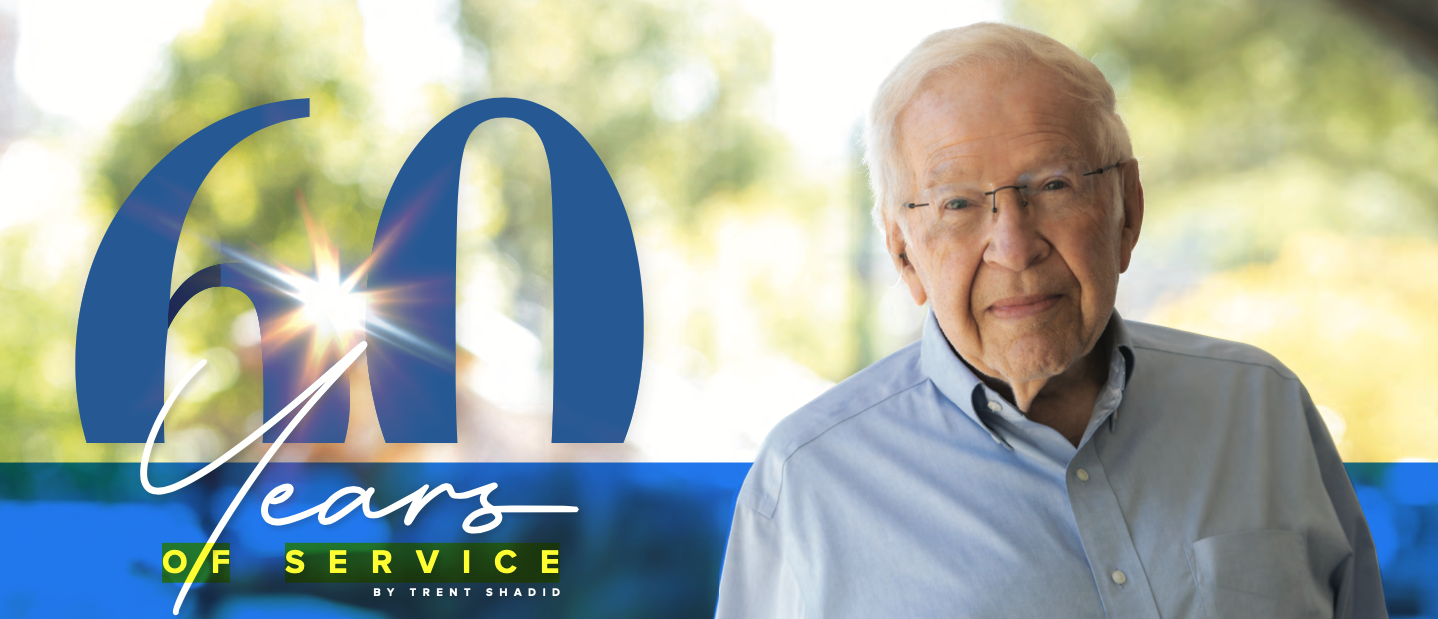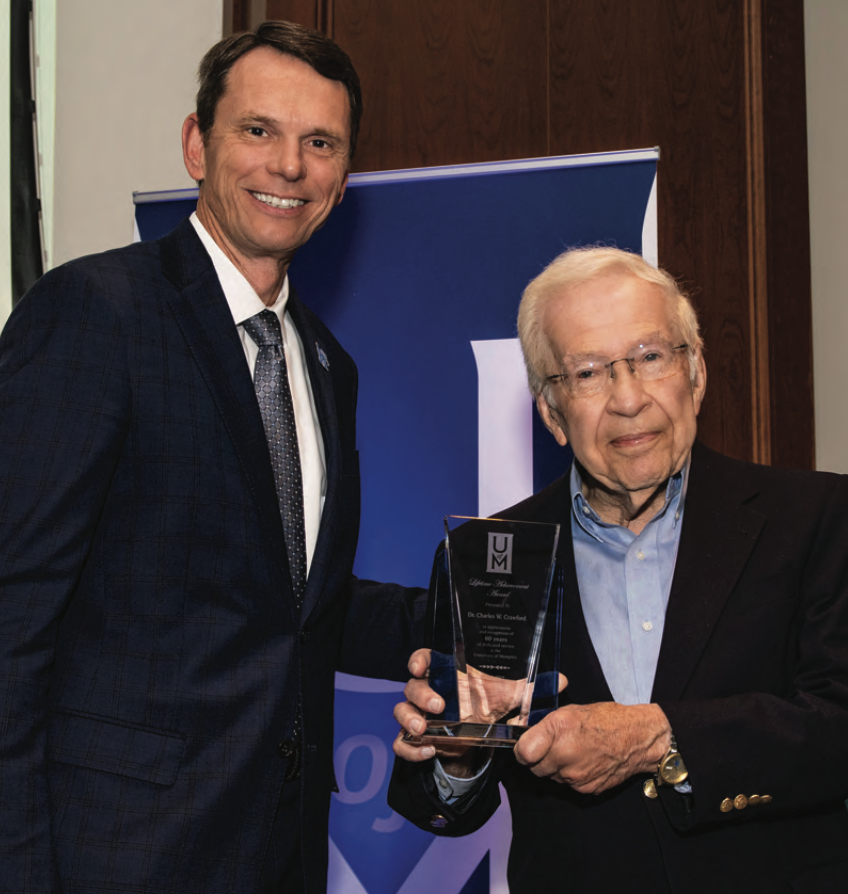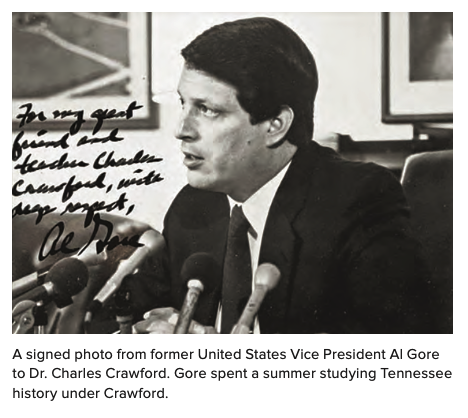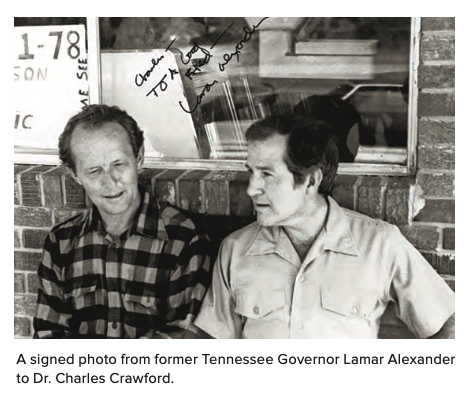UofM Magazine
60 Years of Service

By Trent Shadid
Sixty years of employment is far more than a career. It is a lifetime of dedication.
That is what Dr. Charles Crawford, a Department of History professor, has given to the University of Memphis. Founded in 1912, the institution has existed for a decade longer with Crawford on campus than it did before his arrival.
In Crawford’s first semester as an instructor at the University, John F. Kennedy was president, The Four Seasons spent 10 weeks atop the Billboard Hot 100 and Johnny Carson began a 30-year run as host of The Tonight Show.
With a reputation for working late into the night, typically while writing or editing a book or journal article, it is without question that Crawford has learned more about the various subjects he’s meticulously researched than just about any other scholar of his time.

Still, humility has remained among his most noticeable personality traits according to those who know him best. That was on full display in November 2022 when the University honored Crawford’s 60-year achievement at the Career Milestone Awards ceremony.
“This is a marvelous occasion for me,” Crawford said. “I don’t think I have ever enjoyed anything more than having the opportunity to tell this institution, ‘Thanks.’ I am really appreciative of it, and I hope that I have given something to this institution to compensate for the pleasure I have found in being here. I think you all must be the best faculty and associates of all kinds in the world.”
Crawford’s time at the UofM began as an assistant professor in 1962 when he was hired by then-University President Cecil C. Humphreys. He has worked under 10 University presidents in total — seven full-time and three interims. He has known them all on varying levels and has always left his door open to help them should they need it as part of his passion and advocacy for the UofM.
“Shortly after I was named president, I got an email from Dr. Crawford offering his assistance from a historical perspective with references and sources,” said UofM President Bill Hardgrave, who began his tenure in 2022. “Little did I know that he is the historical reference for the University.”
In 1967, Humphreys appointed Crawford to establish and lead the University’s Oral History Project. He has served as the project’s director ever since, conducting or supervising more than 2,000 oral history interviews on historical and biographical topics related to the Mid-South area.
His oral history work includes becoming the first person from a southern institution to be elected president of the Oral History Association. He’s participated in many scholarly programs on oral history projects throughout the U.S. and in several foreign countries.
“One aspect of the oral history work we have done includes hundreds of interviews with World War II Memphis-area veterans,” Crawford said. “In that, you have a history of what the war was like for the people that were in it. That’s just one example of oral history and its importance in preserving our past for the future. These people are gone, but their stories speak.”
As an educator, Crawford has helped shape future careers by successfully advising 38 doctoral dissertations and 61 master’s theses in addition to teaching various undergraduate courses. Numerous papers written in his graduate classes have been published in historical journals, and several of the dissertations have subsequently been published as books.
“The students are the most important thing we have,” Crawford said. “Teaching them and passing along knowledge is one of the most important things we do. You are helping people achieve something they work extremely hard toward and assisting in setting them up for a career. I think that is what I have enjoyed most, the success of the students. Personally, for me, there is great reward in that.”
Crawford's appreciation for the time spent with his students is mutual. Michael T. Bertrand, PhD, came to the UofM 30 years ago to write a doctoral dissertation on Elvis Presley and southern history. Crawford was the perfect fit as an advisors.
“I found out early that what made Dr. Crawford special had less to do with his encyclopedic knowledge of local, state and regional history — and his knowledge is rightly recognized as formidable — and more to do with his exceptional ability and desire to inspire within his students a confidence that they could achieve anything they attempted,” said Bertrand, who earned his PhD in 1995. “His enthusiastic support was always present. So many of us owe him greatly for providing the model for what it means to be a historian, teacher, mentor and friend. He is the epitome of what makes a great university professor.”
With Crawford serving as a key inspiration, Bertrand pursued a similar career path. He is now a history professor at Tennessee State University after previously teaching at the UofM, Middle Tennessee State University and the University of Mississippi.
Many of Crawford’s colleagues at the University and acquaintances throughout Tennessee have echoed those same feelings of respect and admiration felt by his students.
“My wife Julia and I have known Dr. Crawford for over 40 years,” said Bill Gibbons, who served many years in state government and is currently the executive director of the Public Safety Institute at the UofM. “His knowledge of Tennessee history is unsurpassed, and many have benefitted from that knowledge. We include ourselves among those beneficiaries and have been blessed by his friendship. Tennessee and Memphis are better because of Dr. Crawford.”
Crawford has formally and informally educated and interviewed many well-known politicians throughout his career.

Twenty-four years before he became U.S. vice president, Al Gore spent a summer studying Tennessee history under Crawford ahead of his senior year at Harvard. A photo of Gore hangs in Crawford’s office with the inscription, “For my great friend and teacher Charles Crawford, with deep respect, Al Gore.” Former Tennessee governors Winfield Dunn and Lamar Alexander can also be counted among those who have called Crawford a friend and trusted history source.

“The extraordinary is ordinary with Dr. Crawford,” said Dr. Kent Moran, a research associate at the UofM's Center for Earthquake Research and Information who earned a PhD in 1999 with Crawford as his advisor.
“With him, it’s like, ‘Yeah, I taught Al Gore Tennessee history.’ It’s just very matter-of-fact because he’s perfectly at ease with people of all social statuses. His interconnectivity with the historical world around him is amazing. He knows everybody. His Rolodex would be like an encyclopedia by our standards.”
Though fascinated by learning and sharing the past, Crawford always remains equally as excited about what is to come. For him, even at 91, that means more educating — himself and his students — with no plans to retire.
“Truly, I think the future of this institution is bright and it is a pleasure to be part of it,” Crawford said. “I hope we have more fun during the next 60 years.”
